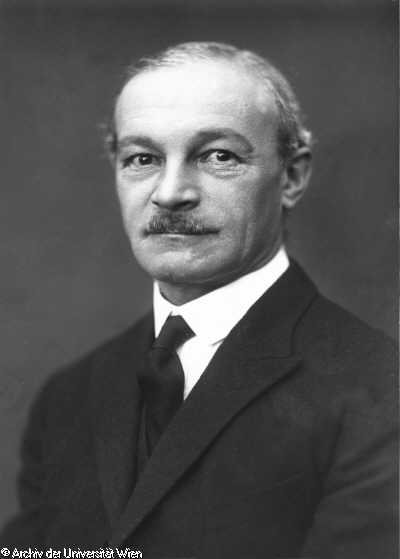Johann Wilhelm (Jean) Billiter (Billitzer)
| Born: |
05-23-1877 |
| Faculty: |
Philosophical School |
| Category: |
Expelled teacher |
Johann Wilhelm BILLITER (Jean BILLITZER) (born on May 23rd, 1877 in Paris, died on April 1st, 1965 in Salzburg), had graduated at the Philosophical School at the University of Vienna in Chemistry on June 13th, 1900 with the academic degree 'Dr. phil.' (dissertation:
Über die Affinitaetsgroesse gesaettigter Fettsaeuren) and was private lecturere ("Privatdozent") with the tile of an extraordinary professor for physical chemistry at the University of Vienna in 1938.
He was deprived of his academic venia legendi and was expelled from the University on April 22nd 1938 for political reasons.
He was also deprived of his academic degree on July 14th, 1942 with the racist argument, that he as a Jew was not considered dignified an academic degree of a german university ('
eines akademischen Grades einer deutschen Hochschule unwuerdig').
It took 13 years since the deprivation – and a very long time since the end of Nazism – until the regranting of the doctorate took finally place on May 15th, 1955.
Billiter was the son of the general manager of the Société Générale in Paris and co-founder of the Rio Tinto Society, Joseph Billiter. He attended elementary school in Paris until his family moved to Vienna in 1884. After graduating from secondary school he studied physics and chemistry at the Universities of Vienna, Munich and Heidelberg from 1895 until 1900. During this time, he interrupted his studies for a voluntary year. In 1900 he obtained his doctorate at the University of Vienna. Following this, he worked for three semesters for Walther Nernst in Göttingen and then went to Paris for one semester. In the fall of 1902 he became an assistant at the 2nd chemical university laboratory in Vienna under Adolf Lieben. Already in the following year, Billiter - who had gained some renown through his work on absolute potentialities and colloids - was able to habilitate for physical chemistry. Subsequently, he focused on capillary electrical phenomena as a means to determine the absolute zero of electrical potential differences as well as working on colloidal solutions.
After his habilitation, around 1905, he started to work on problems of technical electrochemistry and made some important inventions in this field. The results of this work were - among other things - two books on technical applications for electrochemistry.
[1] Meanwhile, in 1907, he asked to be put on leave from the University of Vienna for two years, because he was not able to do “modern electrochemical work” due to a lack of proper equipment.
[2] In 1917, the conferment of the title of associate professor was discussed, after Billiter had - aside from his work in electrochemistry - also applied himself to color photography, and his patents were used at factories in several countries. Although the title was approved by the commission, it was denied in a faculty meeting. This was due to “concerns” about Billiter’s integrity in regard to his patents, as well as about his nationality: Rudolf Much, for example, had misgivings about Billiter’s first name “Jean”, which he had not translated into German.
[3] Four years later the application was renewed and when it was discussed by the faculty, Rudolf Wegscheider made it clear that Billiter defined himself “as a German” and that the doubts concerning his patents were “unfounded”. On October 7th, 1921, Billiter was made associate professor. The next important step in his career was a two-year study and work stay in “North America” from 1932 until the end of the winter semester 1933/34.
Under the National Socialist regime, Billiter’s teaching career ended abruptly: The ministry of education revoked his teaching license as of April 22nd, 1938.
[4] The exact reasons for this measure do not become clear in the files. There also is no mention of possible political activities by Billiter. It is probable that his French heritage was a main reason for his dismissal. In any case, he decided to leave the “Third Reich” and emigrated to Beaulieu sur mer in France.
According to the sources, he did not return to the University of Vienna - there is no mention of him either in the course catalogues of the first two semesters after the war or in the personnel index of 1950/51.
[5] He did, however, return to Austria and worked as a chemist in Gilgen/Wolfgangsee.
Billiter, who received the Auer-medal from the Association of Austrian Chemists, was not only a scientist, but also an author and composer. He furthermore worked in mining and was the president of the Graphit-Bergbau-AG in Mühldorf and chairman of the ironworkers union in Pitten. He is the namesake of the Siemens-Billiter-cell, which was used in Austria, Germany and England.
Lit.: Austrian State Archive ÖStA/AVA, PA Billiter; Archive of the University of Vienna/PH PA 1042, PHIL GZ 659 ex 1937/38, VVZ SS 1945, WS 1945/46, PSTV 1950/51; PLANER 1929; Poggendorffs Biographisch-literarisches Handwörterbuch für Mathematik, Astronomie, Physik, Chemie und verwandte Wissenschaftsgebiete. Bd. V: 1904–1922. Teil 1, Leipzig – Berlin 1925; Johann Christian POGGENDORFF, Biographisch-literarisches Handwörterbuch der exakten Naturwissenschaften. Bd. VIIa – Teil 1, Berlin 1956; TEICHL 1951; Lit: MÜHLBERGER 1993, 38; POSCH 2009, 395.
[1] UA, PA, fol. 32, Kommissionsbericht zur Verleihung des Titels eines ao. Prof. an Billiter, o. D.
[2] Ebd., fol. 27, Billiter an den Akademischen Senat, 16. 10. 1907.
[3] Ebd., fol. 34, Protokoll zur Verleihung des Titels eines ao. Prof. an Billiter, 28. 4. 1917.
[4] UA, PHIL GZ 659-1937/38, fol. 54, PHIL Dekanat an Billiter, 23. 4. 1938.
[5] Vgl. UA, VVZ SS 1945; VVZ WS 1945/46; PSTV 1950/51.
Andreas Huber (translated by Thomas Rennert)
